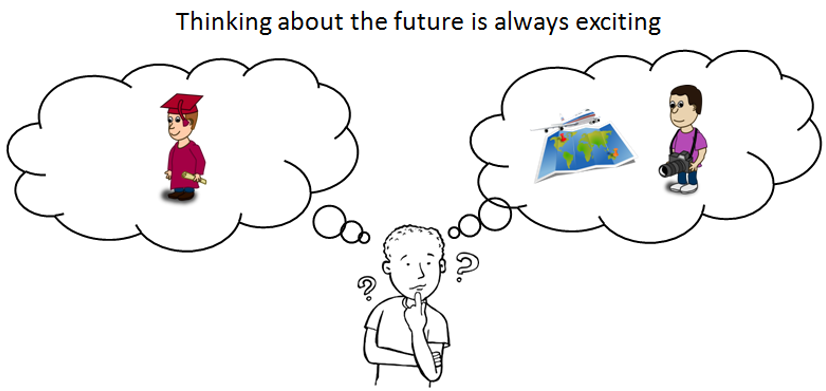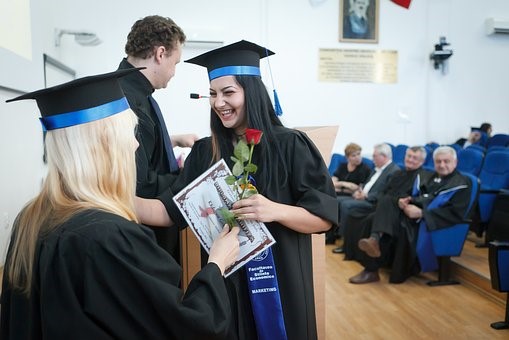Idiomatic Future (BE GOING TO) to express plans and intentions in the future

In this unit you will learn how to express future plans and intentions using BE GOING TO.
In the first part, you will read about the story of a girl, her plans and her mother’s plans to see this grammar form in context. Then, you will practice locating specific information from a text describing the McCartney’s plans to visit Mexico City. In the listening comprehension, you will listen to a group of graduates who are happy because they finally finished their degree. In the writing section, you will describe some people’s plans for the weekend. Finally, in the speaking section, you will record answers to some questions about your plans. Have fun talking about the future!
By the end of this topic you will:
Use the idiomatic future (be going to) in affirmative, negative and interrogative to express plans and intentions in the future.

Kumar, A. (2016). Dreams [ilustration]. Retrieved from https://pixabay.com/es/sue%C3%B1o-texto-la-palabra-positiva-1780724/
What do you think when you see this picture?
Do you ever think about your future? Can you imagine yourself in 5 years?
What do you think when you see this picture?
What are you going to do next year?
In this unit, we will learn the idiomatic future, better known as “Be Going To”.
Study this situation:
Joanna is talking about her plans for the future. She is deciding what she is going to do. Her mother has plans for her, too.
We use the phrase BE GOING TO to express plans and intentions in the future, or decisions made before speaking.
Look at the structure in the three forms:
I am going to study literature
You are going to play soccer
He is going to buy a present
She is going to ride a new bike
It is going to eat tuna fish
We are going to get married next July
You are going to pass all the subjects
They are going to a dog next month
I am not ('m not) going to go out tonight
You are not (aren't) going to buy another cake
He not (isn't) going to marry her
She is not (isn't) going to be happy
It is not (isn't) going to rain tomorrow
We are not (aren't) going to rent a house
You are not (aren't) going to receive a diploma
They are not (aren't) going to travel to Europe
INTERROGATIVE YES/NO QUESTIONS
Am I going to get a new cellphone?
Are you going to go to the party next Saturday?
Is he going to work with us?
Is she going to buy a new dress?
Is it going to rain tonight?
Are we going to study for the exam?
Are you going to have English class?
Are they going to organize the meeting?
SHORT ANSWERS
Yes, I am.
No, you aren't.
Yes, he is.
No, she isn't.
Yes, it is.
No, we aren't
Yes, you are.
No, they aren't.
INTERROGATIVE WITH QUESTION WORDS
What are you going to do next weekend?
Where are you going to have lunch?
What movie are you going to watch?
How are you going to bake the cake?
Who are you going to meet this evening?
When are you going to finish the semester?
Now, we are describing future plans, so we need time expressions. Study these:

Note: the colloquial or informal word for “GOING TO” is “GONNA”. You can hear it or see it in movies or everyday conversation. However, if you are writing a formal text, choose the complete form “GOING TO”.
Activity 1
A very famous family is going to visit Mexico. Pay attention to their plans when they arrive at the country.

Read the family`s plans in Mexico. When you finish, concentrate on the people and their activities.
Here is the Mc Cartney family. They are Heather, Mary, Stella, Beatrice and James. Their father is Paul. Paul’s wife is Nancy. They live in England, but next Summer they are going to fly to Mexico City.
They are going to do some activities together and others by themselves.
They are going to fly more than 12 hours. When they arrive, they are going to register at the Meliá Hotel.
Stella is going to participate in a fashion parade, and Nancy is going to help her.
James is not going to stay in a hotel. He is going to be at a recording studio all the time.
Nancy is going to go shopping to Xochimilco after the fashion parade.
Paul is going to buy some handicrafts in Xochimilco with Nancy. After that, he is going to have a photo session in the Independence Angel. Many people are going to go and take selfies with him.
On the second Tuesday of their stay, Beatrice and Paul are going to go to Kidzania. Beatrice is going to get a lot of “Kidzoz”. Her father is not going to participate in the activities, so he is going to check Facebook.
Heather and Mary are going to learn how to cook “Churros” in the cafeteria “El Moro”. After that, Heather is going to take a nap in the hotel and Mary is going to go to Chapultepec.
They are going to spend the last weekend sailing on a “chalupa”.
They are going to leave Mexico in August.
Activity 2

Barbulescu, M. (2017). Graduation [photo]. Retrieved from https://goo.gl/UGmQ4q
Three students have just finished their professional examination and they are waiting to receive their diploma.
They are talking about their plans after the exam.

Activity 3
These are some friends that have different plans for tomorrow morning. Let’s describe their plans using BE GOING TO and a verb, in affirmative and negative form.
Look at the following table with images and names. Write affirmative ideas below the images on the left and negative ideas below the ones on the right. Use the time expression “tomorrow morning” in all the sentences.
Pay attention to the following example.
When your writing is ready. Check your work using the rubrics to evaluate yourself.
Activity 4
Do you have plans for the future?
For tonight?
Next week?
What about school?
Are you planning to work and save money to buy everything you dream of?

Read the following questions and record an answer to each one.
1. What time are you going to go to bed tonight?
2. Are you going to travel to any state in Mexico this year? If you are, where are you going to go?
3. What time are you going to get up tomorrow?
4.What are you going to do after class?
5. What are you going to buy tomorrow?
6. When are you going to go to the cinema or a concert?
7. What are you going to eat on your next birthday?
8. What are you going to do next vacation?
9. Are you going to get your degree when you finish the last semester?
10. What is the next present you are going to give?
With this activity, you are going to check if you can use GOING TO properly. It will make you will feel confident when describing or asking about plans and intentions.
Murphy, R. (1997). Essential grammar in use: A self-study reference and practice book for elementary students of English: with answers. Cambridge, UK: Cambridge University Press.
Oxenden, C. and Latham-Koenig, C. (2013). American English File 1. Oxford, UK: Oxford University Press.
Coe, N., Harrison, M. & Patrson, K. (2006). Oxford Practice Grammar. Oxford, U.K: Oxford University Press.